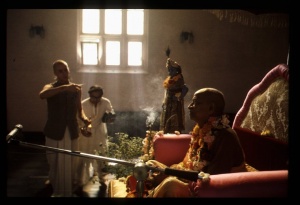SB 6.10.13-14: Difference between revisions
m (1 revision(s)) |
(Vanibot #0054 edit - transform synonyms into clickable links, which search similar occurrences) |
||
| (One intermediate revision by one other user not shown) | |||
| Line 1: | Line 1: | ||
{{info | {{info | ||
|speaker= | |speaker=Śukadeva Gosvāmī | ||
|listener=King | |listener=King Parīkṣit | ||
}} | }} | ||
[[Category:Srimad-Bhagavatam - Canto 06 Chapter 10]] | |||
[[Category:Bhagavatam Verses Spoken by Sukadeva Gosvami - Vanisource|061013]] | |||
<div style="float:left">'''[[Srimad-Bhagavatam]] - [[SB 6|Sixth Canto]] - [[SB 6.10: The Battle Between the Demigods and Vrtrasura|Chapter 10: The Battle Between the Demigods and Vṛtrāsura]]'''</div> | |||
<div style="float:right">[[File:Go-previous.png|link=SB 6.10.12]] '''[[SB 6.10.12]] - [[SB 6.10.15]]''' [[File:Go-next.png|link=SB 6.10.15]]</div> | |||
{{RandomImage}} | |||
==== TEXTS 13-14 ==== | ==== TEXTS 13-14 ==== | ||
<div class="verse"> | |||
:athendro vajram udyamya | |||
:nirmitaṁ viśvakarmaṇā | |||
:muneḥ śaktibhir utsikto | |||
:bhagavat-tejasānvitaḥ | |||
:vṛto deva-gaṇaiḥ sarvair | |||
:gajendropary aśobhata | |||
:stūyamāno muni-gaṇais | |||
:trailokyaṁ harṣayann iva | |||
vṛto deva-gaṇaiḥ sarvair | |||
gajendropary aśobhata | |||
stūyamāno muni-gaṇais | |||
trailokyaṁ harṣayann iva | |||
</div> | </div> | ||
| Line 21: | Line 27: | ||
==== SYNONYMS ==== | ==== SYNONYMS ==== | ||
<div class="synonyms"> | |||
<div | ''[//vanipedia.org/wiki/Special:VaniSearch?s=atha&tab=syno_o&ds=1 atha]'' — thereafter; ''[//vanipedia.org/wiki/Special:VaniSearch?s=indraḥ&tab=syno_o&ds=1 indraḥ]'' — the King of heaven; ''[//vanipedia.org/wiki/Special:VaniSearch?s=vajram&tab=syno_o&ds=1 vajram]'' — the thunderbolt; ''[//vanipedia.org/wiki/Special:VaniSearch?s=udyamya&tab=syno_o&ds=1 udyamya]'' — firmly taking up; ''[//vanipedia.org/wiki/Special:VaniSearch?s=nirmitam&tab=syno_o&ds=1 nirmitam]'' — manufactured; ''[//vanipedia.org/wiki/Special:VaniSearch?s=viśvakarmaṇā&tab=syno_o&ds=1 viśvakarmaṇā]'' — by Viśvakarmā; ''[//vanipedia.org/wiki/Special:VaniSearch?s=muneḥ&tab=syno_o&ds=1 muneḥ]'' — of the great sage, Dadhīci; ''[//vanipedia.org/wiki/Special:VaniSearch?s=śaktibhiḥ&tab=syno_o&ds=1 śaktibhiḥ]'' — by the power; ''[//vanipedia.org/wiki/Special:VaniSearch?s=utsiktaḥ&tab=syno_o&ds=1 utsiktaḥ]'' — saturated; ''[//vanipedia.org/wiki/Special:VaniSearch?s=bhagavat&tab=syno_o&ds=1 bhagavat]'' — of the Supreme Personality of Godhead; ''[//vanipedia.org/wiki/Special:VaniSearch?s=tejasā&tab=syno_o&ds=1 tejasā]'' — with spiritual power; ''[//vanipedia.org/wiki/Special:VaniSearch?s=anvitaḥ&tab=syno_o&ds=1 anvitaḥ]'' — endowed; ''[//vanipedia.org/wiki/Special:VaniSearch?s=vṛtaḥ&tab=syno_o&ds=1 vṛtaḥ]'' — encircled; ''[//vanipedia.org/wiki/Special:VaniSearch?s=deva&tab=syno_o&ds=1 deva]-[//vanipedia.org/wiki/Special:VaniSearch?s=gaṇaiḥ&tab=syno_o&ds=1 gaṇaiḥ]'' — by the other demigods; ''[//vanipedia.org/wiki/Special:VaniSearch?s=sarvaiḥ&tab=syno_o&ds=1 sarvaiḥ]'' — all; ''[//vanipedia.org/wiki/Special:VaniSearch?s=gajendra&tab=syno_o&ds=1 gajendra]'' — of his elephant carrier; ''[//vanipedia.org/wiki/Special:VaniSearch?s=upari&tab=syno_o&ds=1 upari]'' — upon the back; ''[//vanipedia.org/wiki/Special:VaniSearch?s=aśobhata&tab=syno_o&ds=1 aśobhata]'' — shone; ''[//vanipedia.org/wiki/Special:VaniSearch?s=stūyamānaḥ&tab=syno_o&ds=1 stūyamānaḥ]'' — being offered prayers; ''[//vanipedia.org/wiki/Special:VaniSearch?s=muni&tab=syno_o&ds=1 muni]-[//vanipedia.org/wiki/Special:VaniSearch?s=gaṇaiḥ&tab=syno_o&ds=1 gaṇaiḥ]'' — by the saintly persons; ''[//vanipedia.org/wiki/Special:VaniSearch?s=trai&tab=syno_o&ds=1 trai]-[//vanipedia.org/wiki/Special:VaniSearch?s=lokyam&tab=syno_o&ds=1 lokyam]'' — to the three worlds; ''[//vanipedia.org/wiki/Special:VaniSearch?s=harṣayan&tab=syno_o&ds=1 harṣayan]'' — causing pleasure; ''[//vanipedia.org/wiki/Special:VaniSearch?s=iva&tab=syno_o&ds=1 iva]'' — as it were. | ||
</div> | </div> | ||
| Line 29: | Line 34: | ||
==== TRANSLATION ==== | ==== TRANSLATION ==== | ||
<div class="translation"> | |||
<div | |||
Thereafter, King Indra very firmly took up the thunderbolt manufactured by Viśvakarmā from the bones of Dadhīci. Charged with the exalted power of Dadhīci Muni and enlightened by the power of the Supreme Personality of Godhead, Indra rode on the back of his carrier, Airāvata, surrounded by all the demigods, while all the great sages offered him praise. Thus he shone very beautifully, pleasing the three worlds as he rode off to kill Vṛtrāsura. | Thereafter, King Indra very firmly took up the thunderbolt manufactured by Viśvakarmā from the bones of Dadhīci. Charged with the exalted power of Dadhīci Muni and enlightened by the power of the Supreme Personality of Godhead, Indra rode on the back of his carrier, Airāvata, surrounded by all the demigods, while all the great sages offered him praise. Thus he shone very beautifully, pleasing the three worlds as he rode off to kill Vṛtrāsura. | ||
</div> | </div> | ||
__NOTOC__ | |||
<div style="float:right; clear:both;">[[File:Go-previous.png|link=SB 6.10.12]] '''[[SB 6.10.12]] - [[SB 6.10.15]]''' [[File:Go-next.png|link=SB 6.10.15]]</div> | |||
__NOTOC__ | |||
__NOEDITSECTION__ | |||
Latest revision as of 22:25, 18 February 2024

A.C. Bhaktivedanta Swami Prabhupada
TEXTS 13-14
- athendro vajram udyamya
- nirmitaṁ viśvakarmaṇā
- muneḥ śaktibhir utsikto
- bhagavat-tejasānvitaḥ
- vṛto deva-gaṇaiḥ sarvair
- gajendropary aśobhata
- stūyamāno muni-gaṇais
- trailokyaṁ harṣayann iva
SYNONYMS
atha — thereafter; indraḥ — the King of heaven; vajram — the thunderbolt; udyamya — firmly taking up; nirmitam — manufactured; viśvakarmaṇā — by Viśvakarmā; muneḥ — of the great sage, Dadhīci; śaktibhiḥ — by the power; utsiktaḥ — saturated; bhagavat — of the Supreme Personality of Godhead; tejasā — with spiritual power; anvitaḥ — endowed; vṛtaḥ — encircled; deva-gaṇaiḥ — by the other demigods; sarvaiḥ — all; gajendra — of his elephant carrier; upari — upon the back; aśobhata — shone; stūyamānaḥ — being offered prayers; muni-gaṇaiḥ — by the saintly persons; trai-lokyam — to the three worlds; harṣayan — causing pleasure; iva — as it were.
TRANSLATION
Thereafter, King Indra very firmly took up the thunderbolt manufactured by Viśvakarmā from the bones of Dadhīci. Charged with the exalted power of Dadhīci Muni and enlightened by the power of the Supreme Personality of Godhead, Indra rode on the back of his carrier, Airāvata, surrounded by all the demigods, while all the great sages offered him praise. Thus he shone very beautifully, pleasing the three worlds as he rode off to kill Vṛtrāsura.